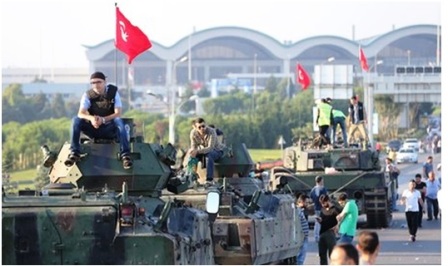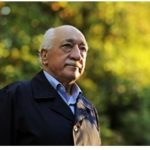Aftermath of Turkey coup attempt will be bloody and repressive

(Note: One is shell-shocked at the mass uprising of the military, if everything was hunky-dory with the government. Equally one is surprised at the speed with which President Erdogan could break the back of the revolting army. It means there is a lot of things to be corrected on either side. The country has been a smoldering volcano for long and the coup was only the gushing out of the burning lava within.Turkey points an accusing finger at a fugitive cleric, Fethullah Gülen, now in Philadelphia, USA. Erdogan had been asking for his extradition, for which Obama needs clear and compelling proofs, which is souring relations between Turkey and USA. What is needed now is not victory celebration by any party but cool negotiations between conflicting interests, for promoting real democracy in Turkey and strengthen better international relations. james kottoor, editor).
Ranj Alaaldin in the Guardian,UK.17/7/16/
Mob rule will shape countgry’s politics as attacks on anyone seen to oppose Recep Tayyip Erdogan and his party continue
The attempted military coup in Turkey on Friday sent shockwaves through the country and international community. Aimed at toppling Turkey’s strongman President, Recep Tayyip Erdoğan and his Justice and Development Party (AKP), the failed uprising threw a spotlight on a deeply divided country embroiled in war at home and abroad.
Turkey is no stranger to military coup, it has undergone four since 1960. Its powerful military has historically regarded itself as the protector of the modern Turkish state and the vision of its founder, Mustafa Kemal Atatürk. It has also devoted itself to Atatürk’s nationalistic and secularist vision, as well as bringing order to the country. The constitutional, historical and cultural basis for its actions has generated resentment and hostility. The army has often abused its powers and has a history of repression and human rights abuses.
When Erdoğan came to power in 2002, one of his immediate priorities was to counter the military. He pursued closer ties with the EU and sought to expand his influence within the country’s institutions. In 2008, the military was severely weakened by Erdoğan in what became known as the Ergenekon affair, a series of trials in which military officers, journalists and politicians were accused of forming a clandestine organisation that plotted against the civilian government. It resulted in prison sentences for senior military members and weakened, if not ended, the military’s capacity to conduct coups as it had done in the past.
In other words, Erdoğan set himself up for another clash with the military, but few expected it to come so soon or in the form of an attempted coup. The most astonishing thing about Friday’s events was that the coup was even contemplated by military factions, given Erdoğan’s grip on the country. Friday’s coup attempt was by far Turkey’s least effective. The military did not control the media and lacked sufficient support both within its ranks and on the streets. It also signified that Erdoğan’s divide-and-rule policies have worked; that he has tamed Turkey’s once-feared military.
However, it should not have been surprising that a move to oust Erdoğan has occurred. In recent years, Erdoğan has alienated rivals and exacerbated Turkey’s instability for his personal gain. He has exploited ethnic and sectarian tensions, restarted a domestic war with the Kurds and sought to divide the population to garner greater constitutional powers. Erdogan’s dangerous games has brought levels of violence and instability not seen in Turkey for decades.
As with many coups around the world, the aftermath will be bloody and repressive. It will be rule of the mob, rather than rule of law that will shape Turkish politics and society. More than 1,000 members of the military have been arrested and more than 2,000 judges have been laid off. Pro-government mobs have brutally attacked anyone they perceive as being anti-Erdoğan or anti-government. Darker days lie ahead for Turkey.
Fethullah Gülen, the reclusive cleric blamed by President Recep Tayyip Erdoğan for the failed coup in Turkey, has said the uprising by members of the country’s military could have been “staged” by the government.
“I don’t believe that the world believes the accusations made by President Erdoğan,” Gülen said. “There is a possibility that it could be a staged coup and it could be meant for further accusations [against Gülen and his followers].”
Gülen, who leads from exile a popular movement called Hizmet and split from Erdoğan over a corruption scandal in 2013, spoke in a small prayer room, lined with woven rugs and decorated with Islamic calligraphy and leather-bound religious books. Reporters were served Turkish tea and sweet dry figs at his Pennsylvania compound, which he moved into after arriving in the US in 1999. He said he rejected all military interventions, and said he had personally suffered after the coup of the 1990s.
*********************

















